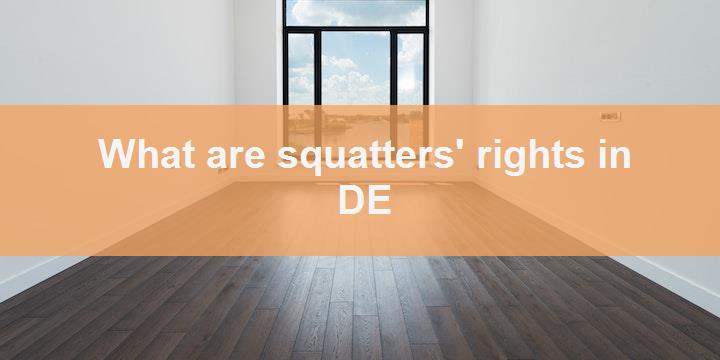What are squatters’ rights in Delaware?
Firstly, it is important to understand what squatters’ rights are. Secondly, it is necessary to know that the laws regarding squatters’ rights differ from state to state. In Delaware, squatters’ rights are restricted and not well-defined. Thirdly, squatters can only claim ownership of property in Delaware after living there for twenty years openly, continuously, and exclusively without the owner’s permission. Finally, it is important to note that squatting is illegal, and squatters can face criminal charges.
What is the squatting/squatter?
To begin with, squatting is when someone occupies a building or land that they do not own or have permission to use. Squatting usually happens when people struggle to find affordable housing or have nowhere to go. Consequently, squatters often live in abandoned properties or empty buildings that have been left dormant for a while. Some may argue that squatting is illegal and disruptive, but others perceive it as a viable solution for those who cannot afford to pay rent. For instance, John, a squatter in London, was homeless for years until he discovered an empty building that he could turn into his home.
What is Adverse posession in Delaware?
Adverse possession is a legal term that refers to a situation where a person gains ownership of someone else’s property without buying it or getting it gifted. In Delaware, adverse possession is governed by strict rules, and there are several requirements that must be met to claim ownership of someone else’s property. Firstly, the dominant possessor must have actually possessed the property for a statutory period. Secondly, the possession must have been open, visible, and notorious. Thirdly, the property must have been possessed under a claim of right or title, which means the possessor must have believed in good faith that they had a legitimate claim to the property. In addition, there are other legal considerations that need to be taken into account. Therefore, it is essential to understand the legal process of adverse possession in Delaware to avoid any legal complications.
Is it legal to squat in Delaware?
Firstly, it is important to understand the legal implications of squatting in Delaware. According to state law, squatting is considered trespassing and is therefore illegal. However, there are certain circumstances in which squatting may be allowed, such as if the property has been abandoned for a certain amount of time. Additionally, there are organizations and resources available to help individuals who are homeless or in need of housing. Therefore, before considering squatting as a solution, it is important to research and understand the laws and resources available in Delaware.
Can police remove squatters in Delaware?
Firstly, it’s important to understand that squatting is illegal in Delaware. Therefore, police do have the authority to remove squatters from the property. However, before taking action, the police must first conduct an investigation to declare the squatters as trespassers. Once this has been established, they may then proceed to forcefully remove the individuals from the property. It’s important to note that the process can be time-consuming and may require a court order. Overall, the law in Delaware does support the rights of property owners, but it’s always advisable to seek legal advice before taking any drastic measures.
How to evict squatter in Delaware?
First and foremost, it’s important to gather all necessary documents pertaining to the squatter’s occupancy. Once you have all the documentation in order, it’s time to serve the squatter an eviction notice. This notice will provide them with a certain amount of time to vacate the property. If the squatter is still occupying the property after the notice period has expired, it’s time to file a complaint for eviction in the local court. From there, a hearing will be scheduled, and both parties will have the opportunity to present their case. If the judge rules in your favor, a writ of possession will be granted, giving you legal authority to remove the squatter from the property. Remember, this process can take time, so it’s important to remain patient and persistent.
FAQ
Q: What are squatters’ rights in Delaware?
A: Squatters’ rights, also known as adverse possession, refer to the legal principle where a person can acquire ownership of a property by occupying it for a certain period of time without the permission or knowledge of the owner. In Delaware, the requirements for adverse possession include continuous and exclusive possession for 20 years, hostile possession, and must be open and notorious possession.
Q: Can anyone claim squatters’ rights in Delaware?
A: No, not everyone can claim squatters’ rights in Delaware. To acquire ownership of a property through adverse possession, the person must meet the specific legal requirements set forth by the state, including occupying the property without the owner’s permission for 20 years or more.
Q: How long does someone need to occupy a property before they can claim squatters’ rights in Delaware?
A: In Delaware, a person must occupy a property continuously and exclusively for a period of 20 years or more before they can claim adverse possession.
Q: What is hostile possession in Delaware?
A: Hostile possession in Delaware means that the person occupying the property is doing so without the owner’s permission or knowledge. The person must also act as if they have a legal right to the property, such as paying property taxes or making improvements to the property.
Q: Can a property owner evict a squatter in Delaware?
A: Yes, a property owner can evict a squatter in Delaware by filing an eviction lawsuit. It is important to note that squatters’ rights do not override a property owner’s right to evict someone from their property.
Q: Can a squatter legally sell a property they have acquired through adverse possession in Delaware?
A: No, a squatter cannot legally sell a property they have acquired through adverse possession in Delaware. The property owner retains legal ownership of the property, and the squatter’s occupancy does not grant them the right to sell or transfer the property to someone else.
Also Reading
Top neighborhoods in Albuquerque for families
South Portland average rent
What is the average rent in Durham?




